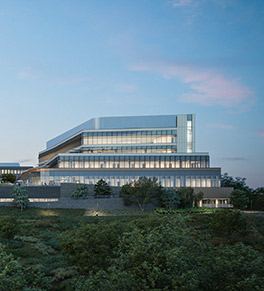
Pituitary Tumor
Though mostly benign, a pituitary tumor is still serious. We are one of few California programs experienced at diagnosing and treating pituitary tumors.
To remove a pituitary tumor, we use a minimally invasive treatment called transsphenoidal surgery. Our approach gets some of the highest success rates in the country.
Symptoms of a pituitary tumor
Your pituitary gland is a tiny organ in your brain located right behind your nose. When a pituitary tumor presses nearby structures in the brain, different symptoms can appear.
A common early sign of a pituitary tumor is trouble with your vision.
When it grows large enough to pressure your optic nerve, you might experience double or tunnel vision. Or you may lose your peripheral vision. You may also experience:
- Headaches
- Sinus or ear pain
- Droopy eyelid
- Seizures
- Nausea and vomiting
Additional pituitary tumor symptoms
Your pituitary gland is often called the “master gland” because of its importance in regulating body functions. This master gland produces and releases many hormones.
Abnormal cell growth on your master gland can change your hormone levels. This produces symptoms like:
- Weight gain or weight loss
- Puffy and enlarged hands, feet, ears and nose
- Hard and thickened nails
- Tiredness (fatigue)
- Anxiety or depressionBack and joint pain
- Changes in menstruation in women, such as infrequent periods, no periods or irregular cycles
- Loss of sex drive
- Shrinking testicles in men
When to seek care for a pituitary tumor
If high levels of growth hormones are getting stimulated, your hands, feet and face might get bigger. If your thyroid is being affected, that could result in a fast heart rate or weight gain. Some men may experience unusually low libido.
Seek care when you notice these symptoms or vision problems. Your primary care doctor might order hormone labs, see the abnormality, then get a brain scan. If the symptoms feel urgent, go to the emergency room.
You can always reach out to the UCI Health Comprehensive Brain Tumor Program directly.

Benign pituitary tumors can cause serious problems
Our experts have a spectacular success rate. We diagnose and remove pituitary tumors using the least disruptive techniques possible.
Call 714-456-8000 to make an appointment.
We welcome referrals from community physicians.
To refer a patient to our program, call 714-456-8000 or fill out an online request form. You may also email us at www.ucihealth.org/medical-services/brain-tumor-program/email-us.
One of our brain tumor physicians will return your call within 24 hours. We can see your patient in our offices within 48 hours after insurance approval.

Find a cancer clinical trial
Talk to your doctor to see if a cancer clinical trial is right for you.
Featured Blog Posts

A 'dream come true' realized in Irvine
Dr. Michael J. Stamos once envisioned opening a small cancer center on the UC Irvine campus. What has emerged, he says, is so much more.

Devoted donors pay it forward

Reimagining cancer care for all of Orange County
When it opens July 16, the Chao Family Comprehensive Cancer Center’s newest location will offer superior care, comfort and convenience.
A pituitary tumor diagnosis at UCI Health
Because pituitary tumors cause symptoms so similar to other medical conditions, getting an accurate diagnosis is key.
Our leading pituitary tumor experts will rule out or confirm whether you have a tumor by using these tests:
It’s important to note that because a pituitary tumor can be asymptomatic, our doctors sometimes identify it through incidental findings. For example, if you get an MRI because of an accident, the imaging scan can reveal a growth.
What to do if you have symptoms
Call and make an appointment with us if you’ve noticed blurry vision or unusual, persistent headaches. You can reach out to us directly at the UCI Health Comprehensive Brain Tumor Program.
If you’re experiencing hormone imbalances, like unusual weight fluctuations or the symptoms described above, let us know during our consultation.
Pituitary tumor treatment at UCI Health
The majority of pituitary tumors are benign. If the growth doesn’t cause you any symptoms, we may take a wait and see approach.
However, the tools we use to fight cancer are also helpful to shrink, remove or manage pituitary tumors. We’ll only choose the treatments that are best suited for you.
Why Choose UCI Health for Pituitary Tumor Care
We have a large panel of experts who guide your care
A group of 50+ multidisciplinary specialists meet weekly in our tumor board meeting. We collaborate, looking at the radiology, the pathology and then discuss it as a team to gain consensus on what your treatment should be. Together, we tackle even the most challenging diagnosis.
We use the latest techniques to remove tumors without damaging the surrounding healthy tissue
Transsphenoidal surgery is a minimally invasive technique that reduces your hospital stay and helps you recover faster. Going through the nose helps avoid an incision on your face and nearly eliminates the risk of cosmetic problems after surgery.
Our multidisciplinary care and follow-up is superb
So many specialists coordinate to work together for your care. Your team will likely be a collaboration between a brain tumor expert, neuro-oncologist, neurosurgeon, ENT doctors, neuroradiologist, endocrinologists and ophthalmologists.
For example, pituitary tumors often cause hormone imbalances. You may have uncomfortable or unpleasant side effects like mood swings and changes to your physical appearance. One of our endocrinologists will help you maintain normal hormone levels
Patient support services are available as you’re undergoing any kind of brain tumor treatment
Our social workers can help you address barriers that could get in the way of your treatment. When you are a current brain tumor patient at UCI Health, you have access to our Cancer Support Services.




